- You are here:
- Home »
- Key Tips
Archive Blog Archives
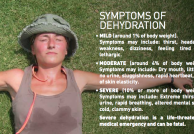
Hydration for hot weather
As environmental temperature rises, the risk of dehydration increases especially in those people particularly susceptible to heat reactions such as children, elderly people, people with reduced mobility, etc. In this new leaflet we provide information about symptoms of dehydration and practical tips to ensure proper hydration of the body under hot weather conditions.
Continue reading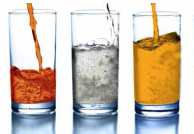
Overhydration
Body water is tightly regulated to ensure we have just enough, and varies by no more than 1% daily in normal, healthy people (around 250-500ml). When body water decreases (e.g. due to sweating) or blood sodium levels rise, thirst is stimulated and the kidneys conserve fluid. Most people respond by drinking slightly more but, in a small […]
Continue reading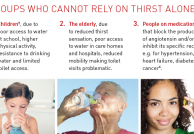
Should thirst be your guide?
For most people, thirst is an adequate stimulus to drink and results in sufficient fluid intake. However, many healthy people are chronically dehydrated, so thirst is evidently not a sufficient stimulus for these individuals.
Continue reading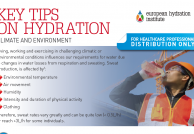
Climate and Environment
Living, working and exercising in challenging climatic or environmental conditions influences our requirements for water due to changes in water losses from respiration and sweating.
Continue reading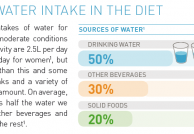
Hydration & Diet
Achieving an adequate intake of water depends on much more than what you choose to drink, as many foods contribute to water intakes too. Taking a total diet approach helps to ensure that you meet your water needs by including a variety of sources.
Continue reading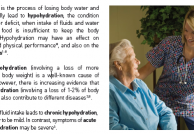
Hydration and chronic diseases
Chronic mild dehydration can be present in many individuals failing to fulfil daily water requirements, but it has been shown to be a common condition in some population groups, including the elderly and those who participate in physical activity in warm environments. In this new issue the effects of chronic mild dehydration are reviewed, and practical tips to maintain […]
Continue reading
Hydration in winter
In cold weather conditions, body fluid losses can be as high as those in hot climates because additional water losses occur as a result of increased urine and respiratory water losses. In this new issue the additional water losses during cold weather are reviewed, and practical tips for staying hydrated in winter are provided.
Continue reading
Hydration while studying
Adequate hydration is important for optimal functioning of the brain. Dehydration can adversely influence cognitive function, and this is important when considering tasks such as studying. In this new issue the consequences of dehydration on cognitive performance are reviewed, and practical tips for staying hydrated when facing cognitive tasks are provided.
Continue reading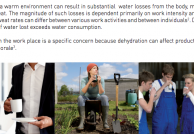
Hydration in the workplace
Hydration in the work place is a specific concern because consequences of dehydration, even mild, can affect productivity, safety, cost, and morale. In this new issue the consequences of dehydration on physical and cognitive work capacity are described, and practical tips about staying hydrated in the work place are provided.
Continue reading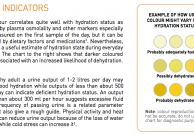
Measuring hydration status
Evaluation of hydration status is not easy, as during daily activities or exercise, fluid compartments are constantly fluctuating, so measuring a single body fluid is insufficient to provide valid information about total body water. In this new issue we present some of the methods used to measure hydration status and focus on those that are simple easy to perform […]
Continue reading
Hydration for summer holidays
In a temperate climate about 2-3 L of water is lost from our bodies each day, mainly as sweat. These sweat losses will be higher when exposed to high temperatures, such as in the summer. Air conditioning also contributes to increase water losses. In this new issue we provide advice on how to stay properly […]
Continue reading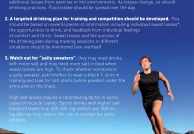
Hydration for sports performance
Severe dehydration impairs performance and increases the risk of heat illness, but drinking too much can also be harmful or uncomfortable. Every athlete is different because they have different sweat losses and different opportunities to drink fluid during their workouts and events. In this latest edition of “Key Tips on Hydration” we provide you with advice on how […]
Continue reading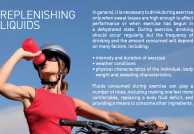
Physical activity
Hydration is an important consideration when engaging in physical activity. During prolonged sessions, water is lost from the body mainly as sweat, and physical work performance is usually decreased when dehydration exceeds about 1-2% of body weight. In this new issue we present some data about how water losses may affect physical performance, and provide advice on how to be […]
Continue reading
Signs and symptoms of mild dehydration
Dehydration occurs when the body loses more water than it takes in. Mild dehydration may have an effect on performance and may lead to an increased risk of adverse health outcomes. In this new issue we deal with the consequences of mild dehydration. Learning to know signs and symptoms may help us to prevent it.
Continue reading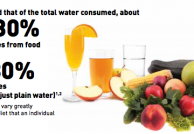
How variety can help hydration
Beverages in addition to plain water are of importance in ensuring proper hydration, but they can also provide us with other benefits. In this new leaflet we give you interesting facts about the role of different beverages in our hydration and in our health and performance.
Continue reading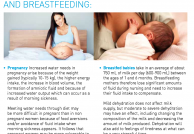
Hydration for pregnant and breastfeeding women
During pregnancy and breastfeeding, an adequate hydration is essential for meeting the new water needs of the body and of the baby in the first case, and to ensure milk supply in the second one. In this new leaflet we provide information about additional water intakes recommendations for both situations and give practical advice to ensure proper hydration.
Continue reading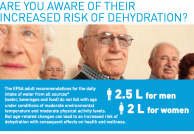
Hydration for elderly people
Elderly people are at a greater risk of dehydration. In this new leaflet we provide an insight into the reasons why liquid intake is often diminished in the elderly and the consequences to health, wellness and performance. Practical tips to help keep elderly people well hydrated are given.
Continue reading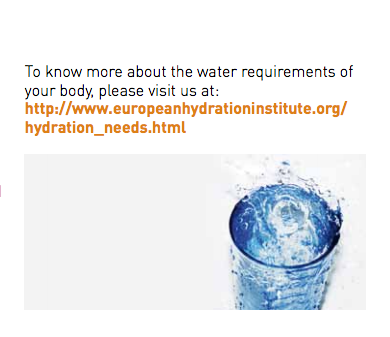
Hydration for adolescents and adults
Water needs vary between individuals and according to diet, environmental conditions, activity levels and a range of other factors. This first issue of the collection focuses on the hydration needs of adults and children over 9 years of age under moderate environmental temperature and physical activity levels. Information about water sources to meet hydration needs is given along with hints and […]
Continue reading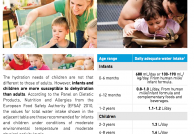
Hydration for infants and children
The hydration needs of infants and children are not that different to those of adults. However, they tend to be more susceptible to dehydration than adults are. In this new issue reference water intake values for infants and children are given, as well as practical tips to ensure proper hydration of infants and children.
Continue reading